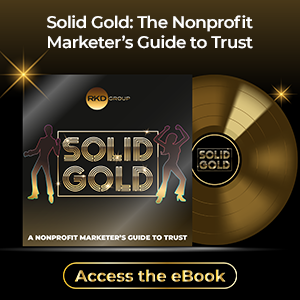Deep down, we all know data is the most important asset a nonprofit organization has in its back pocket.
Unfortunately, most nonprofits aren’t investing in data strategy like it’s their number-one asset.

This is a costly mistake in any season, but it can be especially harmful during this time of economic uncertainty.
In this blog, we’ll take an honest look at the state of nonprofit data, tally up the cost of its imperfection and examine how a well-executed data strategy can lead to high volumes of sustainable growth.
WHY NONPROFIT DATA QUALITY IS DECLINING
Three factors play into the decline of nonprofit data quality:
- Managing data can be overwhelming for any organization, and only a handful of service vendors are still around to do it for you.
- If you choose to bring data management in-house, you run into siloed CRM tools. What tracks your direct mail data doesn’t track your email data or your SMS data, and so on.
- Finally, the companies that do sell tools to help you organize your data don’t provide the internal support your organization needs to actually manage it.
This creates the perfect storm for bad data management habits.
THE COST OF BAD DATA

Why is this cost so high? Even if most of your data records are perfect, the flawed records cost you much more.
Let’s look at the rule of 10 to give a little perspective:
890 records are perfect
110 records are flawed
For every good record that may cost $1.00, every bad record cost $10.00.
Perfect record - $1.00 X 890 = $890
Flawed record - $10.00 x 110 = $1,110
Total = $1,990
As you can see, a few bad records can end up costing your organization big time in the long run.
And lost revenue isn’t the only thing we’re facing here.
Poor data management can lead to lost customers, bad strategy decisions, and even reputational damage.
With this much on the line, you can’t afford not to change your approach to data.
MAKE DATA STRATEGY THE HERO
For any organization looking to improve their data management, they must begin by making data strategy the hero. But to do this, you must review and revise your data processes.
Here are five steps any organization can implement to plan their data strategy:
1. Identify your data management practices
If you don’t have any data management practices, sit down and start putting them together.
2. Create a road map for optimization of data management
To be successful, you must understand where all your data is coming from, where it’s going, who gets to use it, where they’re using it and, at some point, when you need to destroy it.
3. Assess your data quality
Do you know how many duplicates you have on your file? Do you know if your addresses are correct? A simple way to start assessing the quality of your data is to take 100 of the most recent donations to examine what’s missing.

4. Integrate data strategy into your strategic planning
Data is a critical component for any campaign’s strategic plan. Once you have a data strategy, you can unlock a clear pathway for the optimization of programs like direct mail acquisition.
5. Share data strategy with your teams
Make sure everyone understands how, where and when you’re expecting to use your data. A successful data-driven organization must have buy-in across all levels.
You may be asking, “Is this all really possible?” We’re here to assure you that you can get there. Organizations that are committing to data strategy as a primary vehicle for planning are seeing higher volumes of sustainable growth.
To learn more about how your organization can embrace a data-driven future, watch our webinar with The Nonprofit Alliance.





Leave a comment: